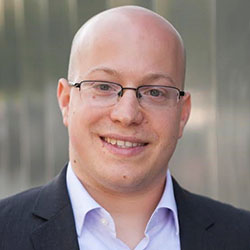QSI RENU team receives MTEC grant to develop regenerative system for wound healing

A regenerative, antibacterial hydrogel shown in solution and gel states (left) and a wireless bioelectronic device (right) that provides continuous monitoring and on-demand electrical stimulation within skin wounds.
A research team at the Querrey Simpson Institute for Regenerative Engineering at Northwestern University (QSI RENU) has received a four-year, $4.7 million grant from the Defense Health Agency (DHA), Research & Engineering Directorate via the Medical Technology Enterprise Consortium to develop an integrated system that can simultaneously accelerate wound healing, lower infection risk, and provide continuous in-wound monitoring. Launched in April of this year, QSI RENU aims to develop scalable and reliable tools that enable the regeneration or reconstruction of complex tissues and organs.

The new proposed technology, dubbed the Regenerative Bioelectronic System (REBIOS), combines a regenerative, antibacterial hydrogel with a wireless electrotherapy device that provides continuous monitoring and delivers stimulation on-demand. Both components have been validated separately in previous proof-of-concept studies, and the researchers expect that combining them into a single, simple-to-use system will have a synergistic effect in promoting healing and preventing infections from skin injuries.
“This project brings together advances in resorbable bioelectronic interfaces and advanced biomaterials to tackle the challenge of accelerated wound healing,” said Jonathan Rivnay, co-principal investigator on the project and the Jerome B. Cohen Professor of Biomedical Engineering and Materials Science and Engineering at Northwestern. “Leveraging components and expertise already proven here at Northwestern, we have an opportunity to push this concept toward field and clinical deployment.”

The research team features four Northwestern faculty investigators, all affiliated with QSI RENU. Co-principal investigator Guillermo Ameer, director of QSI RENU and the Daniel Hale Williams Professor of Biomedical Engineering and Surgery, will lead the development and integration of the antibacterial pro-regenerative hydrogel. Rivnay will oversee the sensor development and project coordination. Co-principal investigator John Rogers, director of the Querrey Simpson Institute for Bioelectronics and the Louis Simpson and Kimberly Querrey Professor of Materials Science and Engineering, Biomedical Engineering, and Neurological Surgery, will design the actuator for the bioelectronic device.
Co-investigator Yuan Luo, an expert on applying artificial intelligence to medical and clinical applications, will assist with spatial transcriptomics analyses — a technology that will provide insight into the biological responses to REBIOS. Luo is a Professor of Preventive Medicine (Biostatistics and Informatics) and Pediatrics and is the director of the Center for Collaborative AI in Healthcare at Northwestern’s Institute for Artificial Intelligence in Medicine.

The Medical Technology Enterprise Consortium (MTEC) is a 501(c)(3) biomedical technology consortium that is internationally dispersed, collaborating with multiple government agencies under a 10-year renewable Other Transaction Agreement with the U.S. Army Medical Research and Development Command. The consortium focuses on the development of medical solutions that protect, treat, and optimize the health and performance of U.S. military personnel and civilians.
The REBIOS is highly relevant to military healthcare because skin injuries are commonly sustained in combat, and battlefield conditions elevate the risk of infection. Given these factors, a technology like the proposed system — which can simultaneously accelerate wound healing and prevent infections — is highly attractive.
In addition, the integrated system is suitable for deployment in both clinical and far-flung battlefield settings because of the wireless nature of the bioelectronic component, its configurability into different sizes and shapes, and the ability of the regenerative hydrogel to be freeze-dried for storage and transportation and then easily reconstituted in water prior to use.

Both components are also resorbable and do not require separate procedures for removal.
Beyond covering preclinical animal studies of REBIOS, the grant will enable the investigators to validate manufacturing workflows for the various device components, establish Good Manufacturing Practices (GMPs) for the hydrogel, and perform biocompatibility testing that is required prior to beginning human trials.
“I am excited to see this technology make its way through our newly established GMP facility at QSI RENU, a milestone and significant contribution to the translational research mission of the institute,” Ameer said. “I look forward to its potential impact on wound care management.”
“We are extremely grateful to MTEC for supporting this multi-pronged project, which will significantly advance our efforts to bring this technology into clinical use,” Rivnay said. “This system could have a transformative impact on wound care for both military and civilian populations.”
This effort is sponsored by the U.S. Government under Other Transaction Number W81XWH-15-9-0001. The views and conclusions contained herein are those of the author and should not be interpreted as necessarily representing the official policies or endorsements, either expressed or implied, of the U.S. Government.